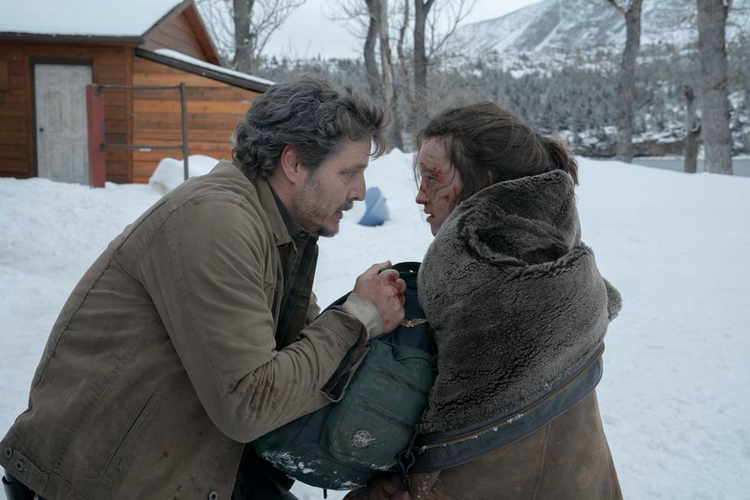“The Last of Us” is not a show about zombies.
O.K.—in a practical sense, “the Infected” in the new HBO series are not undead. Instead, rising global temperatures have allowed the cordyceps fungus, which hijacks the nervous systems of insects, to migrate into human brains. A man named Joel Miller (Pedro Pascal) tries and fails to save his daughter while the world around him succumbs to the disease.
But even without lexical nitpicking, “The Last of Us” is not a show about…whatever you want to call the Infected. It is a show about the relationship between Joel and Ellie (Bella Ramsay), the 14-year-old girl he is charged with transporting across the collapsed former United States.
“The Last of Us” poses the question: “What’s the point?” It then takes us on a journey to answer it through the lives of parents and their children.
The finale this weekend will likely be the biggest television event so far this year—peak viewership for the show has already doubled since the premiere, which already boasted HBO’s second-highest debut in a decade.
“The Last of Us” is based on a 2013 video game of the same name, which itself earned widespread praise for its emotional storyline. At the time, supporters compared it to other video games, specifically zombie video games, whose plot arcs usually consist of: Shoot the zombies. More traditional media like television and film represent a different landscape. The parent-child dynamic has become a mainstay in the doomsday genre, to the point that some critics have suggested that the “The Last of Us” fails to do anything new or innovative with it.
But if that is true, why do these stories keep seeing success? There are countless examples of widely acclaimed stories like this, with the backdrop of Armageddon contrasting a journey of mutual growth between parent and child. Why is that?
Consider the celebrated Cormac McCarthy novel The Road, published in 2006 and long thought to be an influence on “The Last of Us.” A quintessential story of this subgenre, “The Road” tells of a father traveling with his son through a wasteland that was once the United States. The whole book is one big wrestling match between despair and hope. That dynamic is embodied in the father, who leads himself and the boy westward toward rumors of respite, and the mother, who kills herself before the events of the book to avoid the suffering that she knows will come.
McCarthy guards and clutches his expository details as if they were his final ration of nonperishables, offering few physical descriptors and no explanation of the world-ending catastrophe. Locations, for instance, are just “south” or “across a lake.” As a result, all that he leaves the reader to consider is the father-son relationship. Each conflict, from encounters with cannibals to brutal weather, is just a new avenue for the reader to experience the struggle of post-apocalyptic parenting. The shadowy anonymity of the book is what makes it so effective: There is nowhere else to look but at the father and son.
“The Last of Us” is not a show about zombies.
Not every story like this is told in such a minimal way: In 2018, Netflix released “Bird Box,” a high-profile thriller starring Sandra Bullock with plenty of flair. The movie was wildly popular with audiences, breaking a Netflix record for number of streams within 28 days. It, too, tells the story of a parent who takes responsibility for children during the end times, agonizing over the choice to let them die easily or live in a bleak and terrifying world.
Despite its general lack of depth, “Bird Box” does have its moments on parenting. The film shows us early on that Bullock’s character Malorie has her misgivings and fears about motherhood before she gives birth. Throughout the movie, we watch her struggle with parenting the children in her care. One of the characters admonishes Malorie for being so distant—she does not give them names, just calls them “Boy” and “Girl.” Over the course of the film, her emotional relationship with the kids mirrors the physical trip to safety, finally naming them and looking to the future once they arrive safely at a stronghold.
The examples continue: The 2022 winner of the Booker Prize, The New Wilderness, follows a mother and daughter after the collapse of civilization. The 2006 film “Children of Men,” a boon in the box office and lauded by critics, considered parenthood in a world where humans have become infertile. (It has also been discussed about whether it is in some respects a “pro-life film.”) And then there is, of course, “The Walking Dead,” which my colleague Jim McDermott very kindly offered to help me speedrun but likely would have added several thousand words to this piece. Suffice it to say, the central emotional relationship for many years in “The Walking Dead” is that between a father and son.
Stories about life after the end of society have exploded in recent years; publishers report that sales of religious books that counsel about Judgment Day have also risen. The end has always been on people’s minds, but it seems that recent political turmoil and the specter of global warming are placing these stories front and center.
So often, these stories use adult-child relationships as the scale on which to weigh hope and despair. In “The Last of Us,” Ellie carries immunity to the fungal infection in her blood, making her quite literally the last hope for humanity. Joel was charged with delivering her to the scientists working on a vaccine. But Joel himself, cynical and jaded, doesn’t believe in any cure.
They grow closer, Joel’s jagged exterior sanded down by Ellie’s sense of wonder over airplanes and arcade games (as well as her omnipresent book of jokes). The buddy-comedy aspect of the show feels comfortingly familiar. One might expect that as they travel, Joel comes to believe in the vaccine, and their journey is a linear one to save the world.
But like “The Road” and “Bird Box,” “The Last of Us” is never about saving the world. Ellie’s promise of hope has little to do with the vaccine; it is specifically for Joel, that he can forgive himself for the death of his daughter and start caring about someone again. The violence and tragedy that they face are not means to an end. Their relationship itself is the value, the way that they push each other to grow and heal.
Thisis why the show matters. This is what the post-apocalyptic genre can do so well. Parenting on the cusp of oblivion is the ultimate test of hope, the ultimate display of humanity. Like other similar stories, “The Last of Us” poses the question: “What’s the point?” It then takes us on a journey to answer it through the lives of parents and their children. People want to go on that journey together. There is inherent value in the simple act of persevering. And faced with the terrifying realities of modern life, audiences (myself included) resonate with that message.







